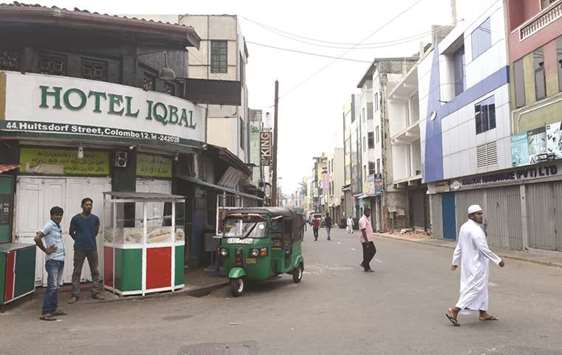An investigation into anti-Muslim riots that spread in central Sri Lanka prompting the authorities to declare a nationwide state of emergency was announced yesterday by President Maithripala Sirisena.
A panel of three retired judges will probe the breakdown in law and order in the picturesque hill resort of Kandy, Sirisena’s office said in a statement.
Three people died, 20 others were wounded and more than 200 Muslim-owned businesses and homes were destroyed in four days of rioting that died down on Thursday.
Eleven mosques were also damaged or completely destroyed by Sinhalese mobs, according to police who say the situation has been brought under control after a heavy military deployment.
A curfew in the district, which is 115km (72 miles) east of the capital Colombo, was lifted at dawn yesterday but army soldiers continued to patrol alongside police, officials said.
Sri Lanka’s Muslim minority held their Friday prayers under military protection across the island amid fears of fresh attacks.
However, the weekly religious activity went off without incident, authorities said.
Hundreds of Buddhist monks and activists staged demonstrations in Colombo on Friday denouncing the anti-Muslim attacks and urging authorities to take strong action against the perpetrators.
Police said nearly 150 people, including the main instigator, have been arrested over the unrest.
They named the main suspect as Amith Weerasinghe, a man from the mainly Buddhist Sinhalese majority known for anti-Muslim activism and outspoken social media posts, and said he was taken into custody on Thursday.
The government declared a state of emergency on Tuesday as the unrest escalated when a Muslim man was found dead in a burnt-out building, a day after a Sinhalese man died of injuries sustained in an attack carried out by Muslim men.
Police also said they were also investigating whether suspects had outside funding or foreign help.
“We are investigating who funded them, their future plans, and whether they have any local political leadership and whether there was any foreign involvement behind this,” police spokesman Ruwan Gunasekara told reporters in Colombo.
He said all 10 suspects had been remanded in custody for 14 days and brought to Colombo for questioning.
He said three were from Kandy and the other seven from outside the district.
Cabinet spokesman Dayasiri Jayasekara said police in some places had failed to carry out orders to curb the violence.
Sri Lanka’s Muslims make up about 9% of its 21mn people and mostly live in the east and centre of the island.
Buddhist Sinhalese account for about 70% and ethnic Tamils, most of whom are Hindus, about 13%.
Some Buddhist nationalists have protested against the presence in Sri Lanka of Muslim Rohingya asylum seekers from mostly Buddhist Myanmar, where Buddhist nationalism has also been on the rise.
However, in some areas, Sinhalese have helped Muslims to protect mosques, Muslim community leaders said.
Sri Lanka was for decades plagued by war between government forces and Tamil separatists. The government defeated the rebels in 2009.

Men stand next to shops that have been closed in protest following deadly communal violence in other parts of the country, in Colombo.
